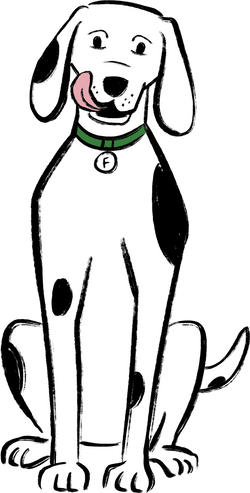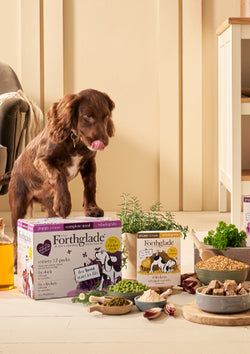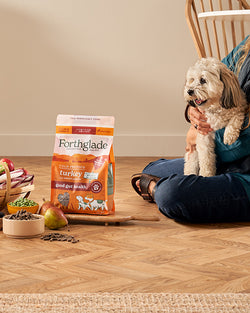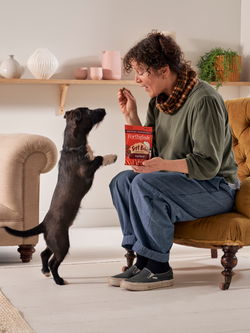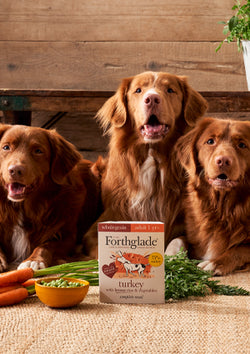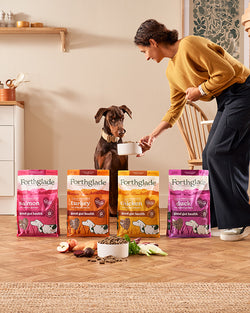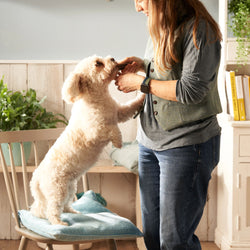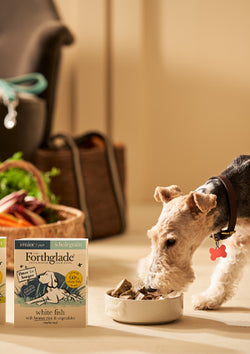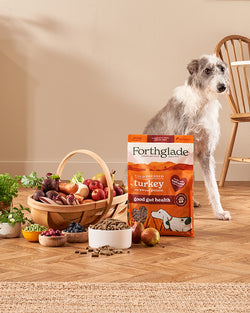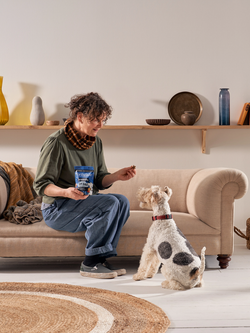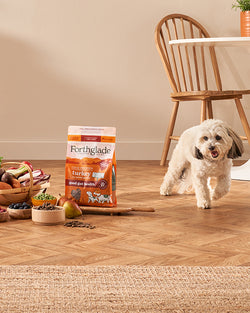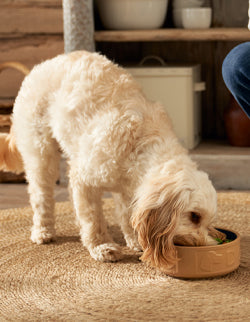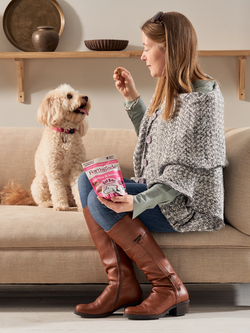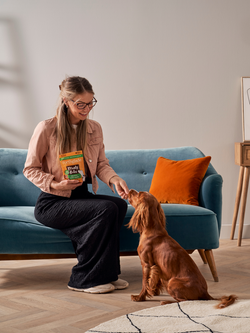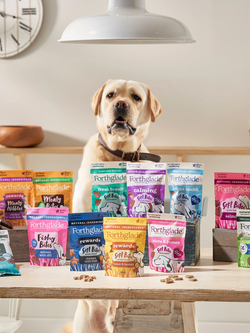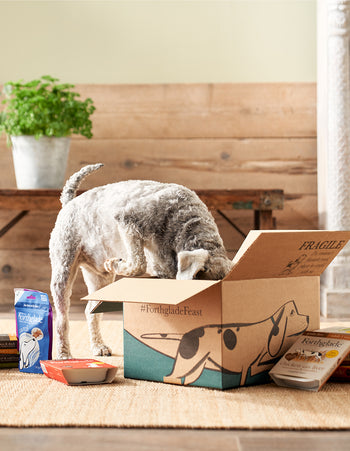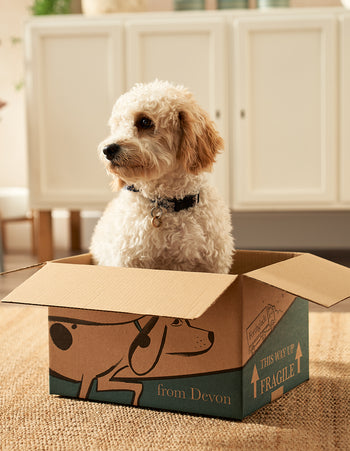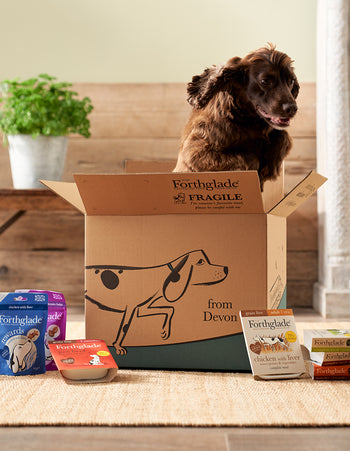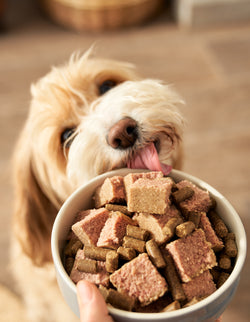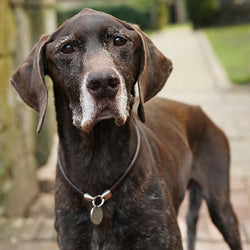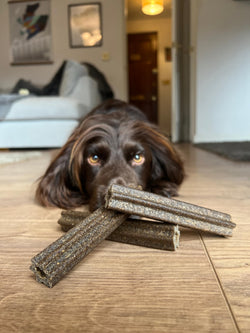How to calm an anxious dog
Cowering, shaking, growling or hiding under the table, when your dog is anxious it can be upsetting and confusing. Triggers such as loud noises, being left alone or changes in routine causing anxiety in dogs is more common that many pet parents realise. In this guide we will explore the signs of anxiety in dogs, what you can do to help them calm down and how to support their wellbeing in the future.
Why is my dog anxious?
Just like humans, dogs can feel overwhelmed. Some pups are more sensitive than others and anxiety can be caused by many different things:
- Loud noises like fireworks or thunderstorms
- Separation from their owner
- Changes to their environment or routine
- Past trauma or poor early socialisation
- Age related issues like cognitive decline in older dogs.
If your dog shakes or hides during fireworks, we have a full guide on dogs and fireworks. For trembling behaviour see why is my dog shaking?

Symptoms of anxiety in dogs
Dogs speak volumes through body language. Spotting the early signs of anxiety can help you respond before things get worse.
Cowering
A frightened dog may crouch lower, or tuck its tail between their legs and hold stiff or rigid.
Pacing
Anxious dogs often struggle to settle and may walk in circles or back and forth repeatedly.
Whining or barking
Vocalising more than usual mainly when left alone can be a clear sign your dog is feeling stressed.
Shaking or trembling
Sometimes anxiety can show physically. Your pup might tremble even when the temperature is warm.
Hiding
Some dogs will hide in a quiet corner, behind furniture or behind doors when they feel threatened.
Signs to give your dog space immediately
Sometimes, the kindest thing you can do is give your dog time and space. Step away if your dog shows:
- Growling or snarling
- Lip licking or yawning when not tired
- Whale eye (showing the whites of their eyes)
- Tail tucked and body rigid
- Turning their head away or avoiding eye contact
These signs often mean your dog is trying to manage their anxiety and needs a moment without pressure.
How to help calm down your dog
Every dog is different, but there are a number of ways to help soothe anxiety when it strikes
- Create a safe space: A cosy den or crate with their favourite blankets can offer comfort
- Keep calm: Your tone and body language can reassure them. Stay relaxed and speak softly
- Use scent: Calming diffusers or sprays that mimic natural dog pheromones may help
- Try a calming chew or treat: Our calming dog treats are made with natural botanicals like chamomile and lemon balm to gently support relaxation.
- Play calming music: Soothing background noise can ease stress
- Consider medication: If your dog’s anxiety is severe, speak to your vet. They may recommend anti-anxiety medication or supplements.

How to ease separation anxiety
Separation anxiety is one of the most common causes of stress in dogs. Signs include barking when left alone, destructive behaviour, or doing their business in the house. Things you can do to help are:
- Practice short departures and gradually build up time away.
- Avoid big hellos and goodbyes. Stay calm to help reduce the emotional highs and lows
- Provide puzzle toys or chews to distract them when you leave.
- Leave an item with your scent, like a worn t-shirt
For more in-depth tips, check out our separation anxiety in dogs guide.
When to call the vet
If your dog’s anxiety is persistent or worsening, it’s important to involve your vet. This is especially vital if:
- Anxiety is disrupting daily life
- Your dog shows aggressive behaviour
- Appetite or sleep is affected
- There’s a sudden change in behaviour
Your vet can rule out underlying health issues and help create a plan for managing anxiety, this might include behavioural therapy or medication.

How to prevent anxiety in the future
Helping your dog feel confident and secure starts with their daily routine.
- Exercise and mental stimulation: Regular walks and brain games (like sniffing games or food puzzles) work wonders.
- Positive reinforcement: Reward calm behaviour and help build confidence through gentle training.
- Routine and predictability: Dogs thrive on knowing what’s next. Keep feeding, walking, and playtimes consistent.
- Good nutrition: A healthy gut supports a healthy mind. Choosing natural dog food made without junk or fillers can help support overall wellbeing.
Some dogs may always be a little sensitive, and that’s okay. With love, support, and possibly long-term management, they can still live a full and happy life.
Final thoughts
Anxious dogs aren’t bad dogs. They’re just trying to tell us something, with patience and the right approach, you can help your dog feel safe, calm, and supported. When they need a little extra help, our calming dog treats are a natural, tasty way to help your pup relax.






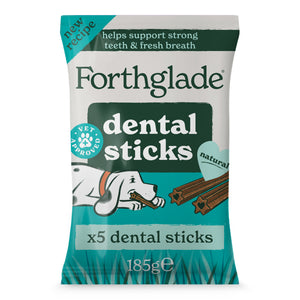
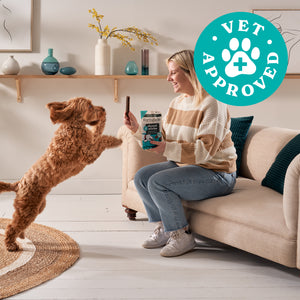
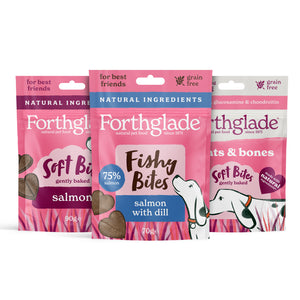
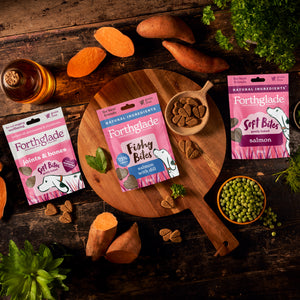


 FAST & FREE DELIVERY ON ORDERS £40+*
FAST & FREE DELIVERY ON ORDERS £40+*
 SUBSCRIBE TO SAVE 10% OFF EVERY ORDER
SUBSCRIBE TO SAVE 10% OFF EVERY ORDER
 OVER 13,600 5 STAR REVIEWS
OVER 13,600 5 STAR REVIEWS

